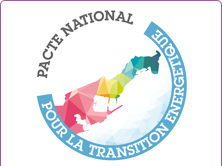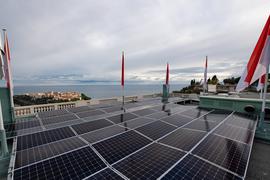BD2M: the future of construction in the Principality
The Principality of Monaco has embarked on an effort to optimise its infrastructure resources through bioclimatic design. The idea is to design buildings in line with climate constraints by involving all stakeholders in the construction industry to reduce the amount of energy consumed by the sector. Buildings are designed and built so that they are heated, cooled and lit in accordance with the weather. Such buildings receive the BD2M – Bâtiments Durables Méditerranéens de Monaco (Sustainable Mediterranean Buildings of Monaco) – certification. It is an approach that is being rolled out more and more widely in the Principality, as we can see with the delivery of the Picapeira building in early 2021, the first state-owned building to be BD2M certified.
The Mission for Energy Transition has set ambitious targets for reducing CO2 emissions. Some of our actions involve supporting one of the main sectors responsible for producing CO2 emissions: construction. Nearly a third of emissions come from the energy generated by infrastructure. Consequently, an approach focused on bioclimatic design, energy efficiency and renewable resources has been promoted during BD2M training sessions.
On 9 December 2020, we worked with EnvirobatBDM to organise a training session on photovoltaic energy. This was aimed at stakeholders in the Principality’s construction industry. Monaco has access to two major sources of renewable energy: the sea and the sun. To optimise solar energy, the Prince’s Government has put in place comprehensive measures:
· A solar resource map that allows people to assess the solar potential of their building;
· An incentive amounting to €360 per MWh generated.
For example, the Principality’s public buildings, whether newly constructed or undergoing renovation, are making use of this initiative to install photovoltaic panels on their roofs.
The BD2M training session on photovoltaic energy was attended by stakeholders from the public and private sectors, architects, installers and design staff of the engineering firm to minimise problems encountered at the design and installation stages. The audience was very diverse, reflecting the need to educate as many as possible of those who could contribute to achieving BD2M certification for buildings, from design through to completion. The session provided an opportunity to present, in a clear and transparent way, the regulatory and economic aspects of photovoltaic energy, in addition to technical information and details of the technology’s footprint.
It also aimed to showcase the value of photovoltaic energy by shedding light on preconceived ideas about it. Photovoltaic technology is not as expensive as it once was. By 2025, the associated capex costs will have fallen to 35% of the current price. Moreover, as a result of the constantly evolving technology, the panels have become much more durable and are up to 95% recyclable. Finally, the aesthetic aspect can deter some architects from using photovoltaic panels for some projects, but the training session clearly emphasised the importance of the technical side and of the contribution to reducing energy consumption. Nonetheless, research continues into ways to make the panels more aesthetically pleasing without reducing their yield, by making changes to the colour of the photovoltaic cells.
Discover the video of the training session
Our human needs are changing alongside the constant improvements being made in emerging technologies. Photovoltaic energy is one possible response to the challenges of today and tomorrow.
BD2M certification for the Principality’s buildings is a decisive stage in the energy transition. Every day, we are looking for ways to reduce our carbon footprint. By building BD2M-certified infrastructure, we can achieve our targets for reducing energy consumption on a larger scale. Continuing with this initiative, further BD2M training sessions will be held soon, on:
· Building management, building automation and energy performance: Tuesday 16 March (online event)
· Greening buildings: Friday 2 July 2021
· Timber construction: Tuesday 28 September 2021
· Eco materials: Friday 3 December 2021
It is important to understand the different data used in new projects. The Mission for Energy Transition supports these training sessions for those involved in the industry to ensure transparency between stakeholders and the quality of project outcomes.


[#YourMonaco]
— Gouvernement Monaco (@GvtMonaco) July 31, 2020
La Principauté se dote d'un nouvel outil de communication urbaine. https://t.co/5f1DsYi2No





